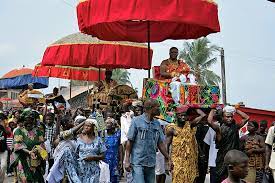Discover the Gologo Festival of the Talensi people in Ghana’s Upper East Region—a unique pre-harvest ritual blending spirituality, tradition, and community unity. Introduction
Every year, as the dry season wanes and the promise of rains looms, the Talensi people of Ghana’s Upper East Region come together to celebrate the Gologo Festival. This sacred pre-harvest ritual, also known as the Golib Festival, is more than just a cultural event; it’s a profound expression of gratitude, unity, and spiritual connection. Spanning several communities, the festival is marked by unique dress codes, traditional songs, and rituals aimed at ensuring a bountiful harvest. In this article, we delve into the origins, significance, and contemporary relevance of the Gologo Festival, offering insights into one of Ghana’s most distinctive cultural celebrations.
Early Background / Origins
The Gologo Festival has deep roots in the agricultural and spiritual life of the Talensi people. Celebrated in March and April, it coincides with the end of the dry season and precedes the sowing of early millet. The festival serves as a plea to the gods for protection, ample rainfall, and a successful farming season. Central to the festival is the veneration of the Golib god, with rituals reinforcing the community’s belief in the Nnoo shrine, a deity that regulates Talensi agricultural life [1] .
Rise / Development
Over time, the Gologo Festival has evolved, encompassing a three-day program across different villages:
- Gorogo: The festival commences here, setting the tone with initial rituals and community gatherings.
- Yinduri: The second day sees the continuation of ceremonies, including traditional dances and songs.
- Teng-Zug (Tong-Zuf): The final and most significant celebration occurs here, with libations poured at the Teng-Zug shrine to thank the gods for a successful occasion [2] .
Preparation for the festival begins in February, with communities learning new songs and preparing costumes. The festival’s date is determined by the appearance of the third moon, which can fall in March or early April.
Achievements / Importance
The Gologo Festival holds immense significance for the Talensi people:
- Spiritual Significance: It reinforces the community’s belief in the Golib god and the Nnoo shrine, seeking blessings for the upcoming farming season.
- Cultural Preservation: The festival’s unique customs, such as specific dress codes and traditional songs, help preserve Talensi heritage.
- Community Unity: By bringing together various communities, the festival fosters a sense of unity and shared purpose.
- Tourism Potential: The festival’s distinctiveness has the potential to attract tourists, promoting cultural exchange and economic benefits for the region [3] .
Challenges / Controversies
Despite its cultural richness, the Gologo Festival faces certain challenges:
- Modernization: As younger generations gravitate towards modern lifestyles, there’s a risk of diminishing interest in traditional practices.
- Infrastructure: Limited facilities can hinder the festival’s potential to attract and accommodate tourists.
- Documentation: A lack of comprehensive documentation may lead to the loss of intricate details of the festival’s rituals and significance over time.
Legacy / Modern Relevance
In today’s context, the Gologo Festival remains a testament to the resilience of cultural traditions. It serves as a bridge between the past and present, reminding the Talensi people of their roots while adapting to contemporary realities. Efforts are being made to promote the festival beyond the region, highlighting its uniqueness and encouraging cultural tourism. By doing so, the festival not only preserves Talensi heritage but also contributes to Ghana’s diverse cultural tapestry.
Conclusion
The Gologo Festival is more than a pre-harvest celebration; it’s a profound expression of the Talensi people’s connection to their land, ancestors, and deities. Through rituals, songs, and communal gatherings, the festival encapsulates the essence of gratitude, unity, and cultural pride. As Ghana continues to embrace its rich cultural diversity, festivals like Gologo play a pivotal role in preserving traditions and fostering national identity. Whether you’re a cultural enthusiast, a traveler, or someone seeking spiritual insight, the Gologo Festival offers a unique and enriching experience.
FAQs
Q1: When is the Gologo Festival celebrated?
A1: The Gologo Festival is celebrated in March and April, with the exact date determined by the appearance of the third moon.
Q2: What is the significance of the festival’s dress code?
A2: The specific dress code, involving towels and traditional attire, symbolizes humility and unity, aligning with the festival’s spiritual themes.
Q3: Can tourists attend the Gologo Festival?
A3: Yes, tourists are welcome. However, it’s essential to respect local customs and participate appropriately.
Q4: What rituals are performed during the festival?
A4: Rituals include sacrifices to the Golib god, traditional dances, songs composed by community elders, and libations at the Teng-Zug shrine.
Q5: How does the festival impact the local community?
A5: The festival reinforces cultural identity, promotes unity, and has the potential to boost local economies through tourism.




